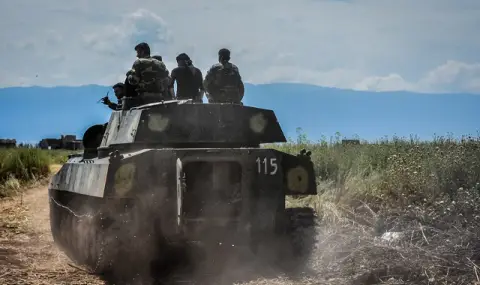From the very beginning, Turkish President Erdogan has provided decisive support to the Syrian opposition. And now he is achieving his goals – to topple Assad and keep the Kurds away from Turkey's borders.
„We have no territorial claims in Syria. We just want to see to it that the real owners of the country get it back. We invaded Syria to end Assad's tyranny.“
Thus, Turkish President Recep Tayyip Erdogan justified the entry of Turkish units into neighboring Syria in 2016. But behind his words Ankara's serious power interests were clearly visible. From day one, Turkey supported the Syrian armed opposition rebellion and strongly demanded the overthrow of Assad. And 5 years later, Turkey established a permanent military presence in the bastion of the Syrian rebels in Idlib.
Today, Turkey is considered the biggest winner in Syria, while Russia and Iran remain the big losers: Moscow was the staunchest ally of the Assad regime, and Tehran supported it, including with military force. "Turkey has definitely won in Syria," says Zaur Gasimov, an expert on Turkish-Russian relations at the German-Turkish University in Istanbul. According to him, Ankara will work closely with the future government of Syria: “Turkey will be intensively involved in the reconstruction work and will remain the largest investor in war-ravaged Syria”, Gasimov believes.
„Ankara will benefit from the reconstruction of Syria and economically when Turkish construction companies receive orders in Syria”, suggests political scientist Berk Essen from the “Sabanji“ University. in Istanbul. “Even though the Turkish policy towards Syria was considered not particularly successful for a long time, Erdogan constantly repeated that one day Assad will fall. And now he will profit from it.“
Indirect support?
„During the last offensive, Turkey played an important role. In a new Syria, Ankara will use this to expand its sphere of influence, Essen is convinced. Turkey supports the Syrian National Army, through which it controls large parts of northern Syria. Thanks to its representation there, Turkey also achieved a certain closeness with the Islamist group "Hayat Tahrir al-Sham". (HTS), but despite this, Ankara has consistently denied being involved in the offensive. Although Turkey does not officially support the HTS and even defines it as a terrorist organization, Ankara supported many northern Syrian militias that participated in the offensive.
I.e. it is legitimate to believe that Turkey is indirectly providing military support to HTS, says Middle East expert Andre Bank of the GIGA Institute in Hamburg. “HTS recently secured new weapons. They currently use drones and missile systems. It can be assumed that all of them were delivered from Turkey”, says Bank. His colleague Simon Mayban of Lancaster University is more cautious: “It is an opaque subject. We don't know exactly to what extent Turkey really supported the rebel offensive.
In fact, NATO member Turkey maintains good relations with Russia and Iran – with which he constantly embarrasses his western allies. A collapse of relations between Moscow and Ankara due to the recent events, however, is not likely, according to the political scientist Gasimov. Bilateral relations will only deepen in the future, he predicts: “The fall of Assad makes Turkey even more important for Russia”.
What is the future of the Kurds?
Turkey's official goal in northern Syria is to prevent the Kurds from asserting territorial unity. Ankara fears that a Kurdish state may be established in the region in the future.
Turkey-backed forces are currently advancing against Kurdish militias and have captured areas in northeastern Syria in recent days. The Syrian Democratic Forces, which control parts of northern Syria, are considered the Syrian branch of the PKK. Since 1984, Turkey has been in conflict with the PKK, which the EU classifies as a terrorist organization.
„In the future, we could actually see an autonomous Kurdish region in Syria, as in Iraq. The difference: in mountainous northern Iraq, it is easier for the Kurds to defend their areas. In flat Syria, it may be more difficult,” says Berk Essen. In addition, it is not yet clear how the HTSH will behave towards the Kurds and other minorities such as Christians.
Return of refugees?
Turkey has a 900 km border with Syria, it has accepted about three million Syrian refugees, i.e. is the country with the most Syrian refugees in the world. Although Erdogan's government accepted many Syrians after the outbreak of the civil war, today the government is under enormous pressure: in economically weakened Turkey, prejudice against Syrians has been growing for years.
„We bet a lot on the territorial integrity of Syria”, Turkish Foreign Minister Hakan Fidan said on December 8 and added: “The millions of Syrians who had to leave their homeland can now return”. In Turkey, expectations are currently growing that this will happen as quickly as possible. On December 9, President Erdogan said he hoped the refugees could return “safely and voluntarily”.
